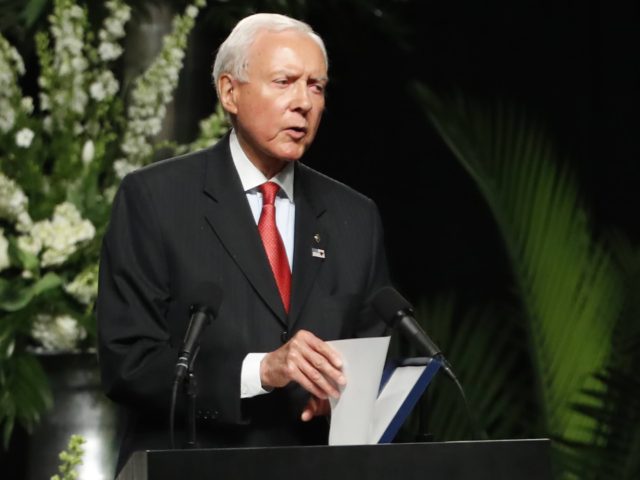Pollak: Orrin Hatch’s Great Speech in Memory of Muhammad Ali
Former Sen. Orrin Hatch (R-UT) passed away Sunday at the age of 88. In 2016, he delivered a eulogy for boxer Muhammad Ali, with whom he enjoyed an unlikely friendship. The following is an excerpt from the e-book How to Write, by the author.
There are many important elements of a good speech, which I will describe below. But a great speech is often made by the circumstances. These are entirely beyond the speaker’s — and the speechwriter’s — control. But it is the duty of a speechwriter to notice them, and address them properly in the text.
A grand or solemn occasion, even one with a captive audience, is not the time to showcase other ideas or causes that might be important. Those can be, at best, alluded to, or carefully woven into the text. But the setting remains the central focus of the speech.
One of the most impressive speeches in recent years was the eulogy delivered by Sen. Orrin Hatch (R-UT) for the late boxing legend Muhammad Ali at his funeral in 2016.
The setting was extraordinary. The audience was filled with celebrities, and athletes, and political activists — mostly on the left, unlike the conservative Hatch. The audience was international, as fans tuned in from across the world.
The most striking thing was that Hatch had been invited to speak at all. His presence on the podium — before he had even said a word — was proof of the breadth of Ali’s friendships.
Hatch began by paying homage to Ali’s boxing career: “He truly was the greatest,” he said. The crowd applauded politely; this was something something they had heard before, from several other speakers.
But then Hatch took it further.
“To assume that Ali’s greatness stemmed solely from his athletic prowess is to see only half the man,” Hatch said.
He spoke about Ali’s role as a civil rights leader, as a family man, and as a friend.
“Indeed, it is as a personal friend that I witnessed Ali’s greatness for myself,” Hatch said. The room was silent, in rapt attention: this was new.
Hatch noted that his friendship with Ali had been puzzling to “those who saw only our differences.”
“Where others saw difference, Ali and I saw kinship,” he said.
He went on to describe that although they had different religious faiths, and different political commitments, they both had a poor upbringing, and shared a willingness to look beyond conventional divisions.

LOUISVILLE, KY – JUNE 10: Sen. Orrin Hatch (R-UT) speaks at a memorial service for boxing legend Muhammad Ali on June 10, 2016 at the KFC Yum! Center in Louisville, Kentucky. Ali died June 3 of complications from Parkinson’s disease. (Photo by Aaron P. Bernstein/Getty Images)
Hatch recalled taking Ali to listen to the Mormon Tabernacle Choir in Salt Lake City, and that Ali had handed out autographed pamphlets explaining his own Muslim beliefs. He described Ali’s later work for charity in Utah, particularly for women.
“Ali didn’t look at life through the binary lens of Republican and Democrat, so common today, He saw worthy causes, and shared humanity. In Ali’s willingness to put principles ahead of partisanship, he showed us all the path to greatness. And I’ll never forget that greatneess, nor will I ever forget him,” Hatch said, to applause.
He continued, explaining that there was “something else that made Ali ‘the greatest.’” In his struggle with Parkinson’s disease, Hatch said, “he pointed us to a greatness beyond ourselves, a greatness beyond even Ali. He pointed us to the greatness of God.
“I believe that we’re here on earth for a reason,” Hatch continued. “I believe that this earth life is a time for us to do what’s right for God, for our fellow men and woman. I don’t know that I’ve ever met anybody who did it any better than my friend, Muhammad Ali.”
For all the wonderful reminiscences of Ali’s life as a boxer and public figure, from more likely figures, Hatch’s speech was the one that lingered in my memory. (I wrote him a handwritten letter praising the speech — and received a gracious, and grateful, reply from Hatch himself.)
Hatch’s speech would have been notable even if he had given a rather ordinary address reciting Ali’s achievements, simply because he was at the memorial service — virtually the lone Republican, and white Mormon, among a largely black, and Muslim, audience.
But the speech was memorable because Hatch took what was unique about the setting and used it as his theme. He pointed explicitly to Ali’s ability to transcend racial, political, and religious boundaries, and then identified the common principle — faith — that had allowed him to do so.
Even today, as I type Hatch’s lines, I can feel a lump in my throat.
Joel B. Pollak is Senior Editor-at-Large at Breitbart News and the host of Breitbart News Sunday on Sirius XM Patriot on Sunday evenings from 7 p.m. to 10 p.m. ET (4 p.m. to 7 p.m. PT). He is the author of the recent e-book, How to Write: $50,000 of Lessons for $5. His recent book, RED NOVEMBER, tells the story of the 2020 Democratic presidential primary from a conservative perspective. He is a winner of the 2018 Robert Novak Journalism Alumni Fellowship. Follow him on Twitter at @joelpollak.





Comments are closed.